Are your missing teeth preventing you from eating the foods you like? Speaking with confidence? Smiling? If so, dental implants may be the permanent solution you’ve been looking for
Missing One or More Teeth? Then Dental Implants May Be Right For You!
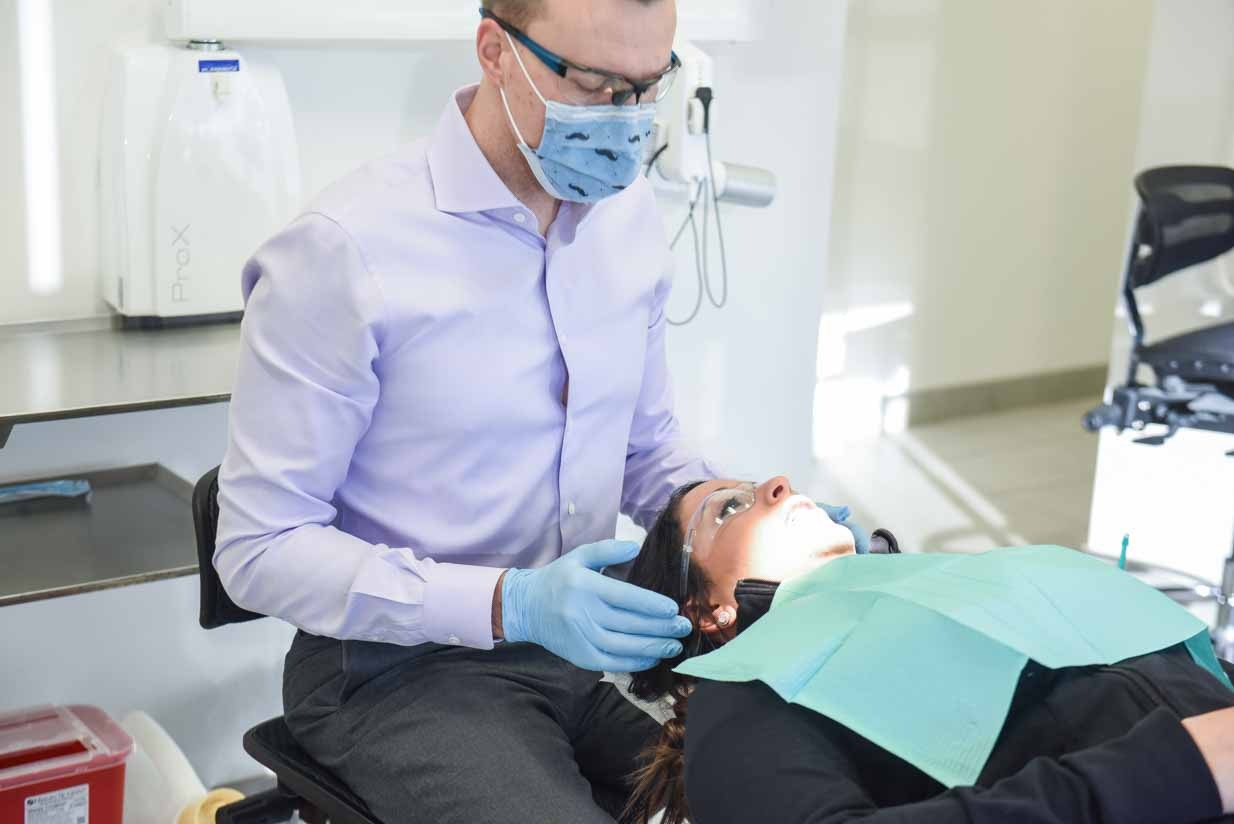
What are Dental Implants?
They are small titanium posts surgically implanted into your jaw bone that replace missing tooth roots, helping to preserve the bone in your jaw and the original shape of your face. Best of all, dental implants look, feel, and function so much like your natural teeth, you’ll forget that you even lost a tooth at all!
The implant acts like the root of a natural tooth and bone forms around a special coating on the implant to hold the implant firmly in place. This process is referred to as ‘osseointegration’. A crown – with the look, feel, and function of a natural tooth – is then affixed to an abutment which is connected to the implant. The ‘abutment’ is simply a small connecting piece between the implant and the crown.
Dental implant placement is an in-office minor surgical procedure that can be completed in 30 minutes, or a few hours, depending on how many implants are being placed. Dental implant placement can be completed under sedation, to help reduce your anxiety.
Single & Multiple Tooth Replacement
Single-tooth Dental Implants will work and look like your own natural teeth. However, for some patients, it may be difficult to make the implant look exactly like your existing natural teeth. Depending on your existing oral health and the condition of your gums and bone structure, your implant may not be able to be placed straight. In this case, the Dental Implant would have to be inserted at an angle relative to the healthy bone. The available healthy bone structure always dictates the placement of the Dental Implant. Occasionally, this results in the Dental Implant not corresponding exactly to the desired point in the mouth in order to have it securely and successfully placed.
Multiple Tooth Replacement is also called a Dental Implant-Supported Bridge. It is very similar to a regular dental bridge, but instead, it is supported by Dental Implants and not by the surrounding natural teeth. In most cases, one implant is placed in the jawbone for each missing tooth. Then the dental crowns are connected to form one complete piece.
Implant-Supported Bridges are used when more than one natural tooth is missing. It may also be used when your periodontist is concerned that you might be putting too much pressure on individual Dental Implants that are not connected to each other. For example, you may clench or regularly grind your teeth while sleeping. This puts extra pressure on the individual Dental Implants. It also increases the chance that they may loosen from the bone and fail. By using an Implant-Supported Bridge, you can reduce the overall pressure on the individual Dental Implants and spread the forces on your teeth across the entire bridge.
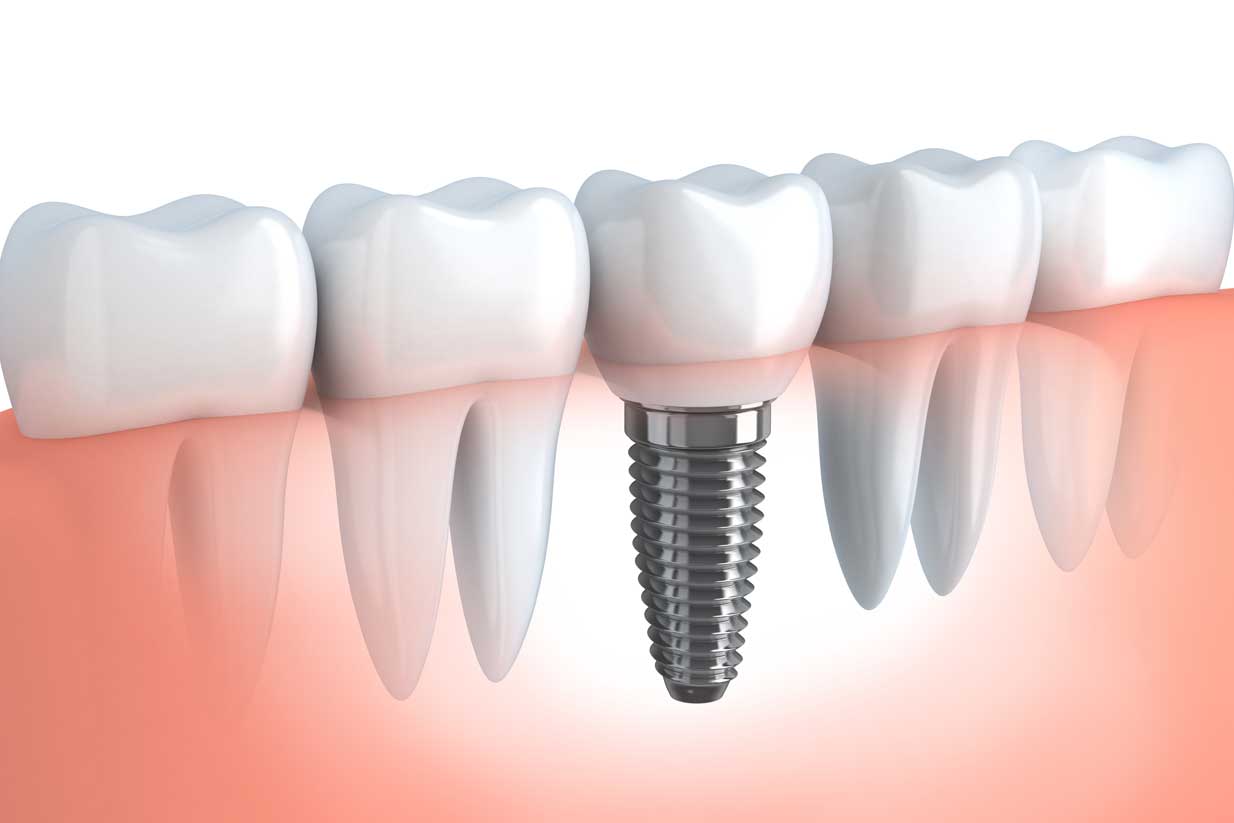
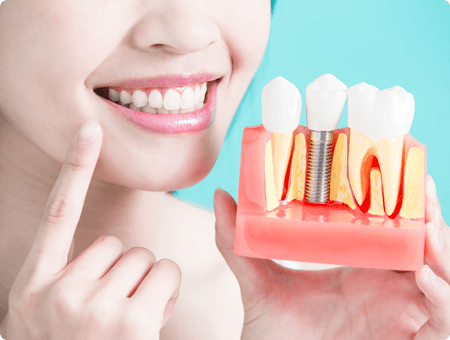
What is Full Arch Replacement?
When all teeth are missing – or have reached a condition that they need to be replaced – a fixed bridge anchored to Dental Implants can be a good permanent solution to replace a full arch of teeth. Bonded to your jaw bone and supporting the tooth crowns above, they act like real tooth roots, thus allowing us to anchor the bridge directly to your jaw.
Before Dental Implants, there was no other fixed solution available to people who had lost all their teeth except a full set of removable dentures. Today it is now possible to replace a full jaw of teeth using Implants and a fixed dental bridge. This technique can now provide you with a permanent, stable, and highly esthetic alternative to removable dentures.
The success rate for dental implants is very high. And with proper care, good dental hygiene, and a healthy lifestyle, it is rare that implants will fail. Over the past 30 years, hundreds of thousands of implants have been placed in patients. Even today, many of the *original* implants are still functioning without problems! Technology and procedures have advanced significantly since the first implants were placed. The success rate for implants is now in the 95%+ range. Some reasons for failed implants can be attributed to an unhealthy lifestyle (smoking), and poor dental hygiene.
Types of Full Arch Replacement & Cost
Are your missing teeth preventing you from eating the foods you like? Speaking with confidence? Smiling? If so, dental implants may be the permanent solution you’ve been looking for
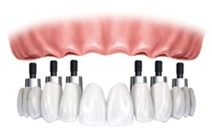
Conventional Full Arch and Bridge on Dental Implants (6 to 8 implants)
Fee: $$$$$ to $$$$$$
Average Treatment time: 6 months to 2 years.
(Price and treatment time depends on the amount of bone grafting required, number of implants used, and type of temporary prosthetics used)
Benefits: Replaces all missing teeth, and smaller prosthetic size. Maximum stability (not removable).
Drawbacks: Requires multiple surgical visits.
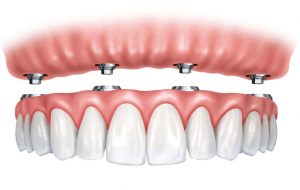
All-on-4® Hybrid Dental Bridge (4-6 implants)
Fee: $$1/2 to $$$
Average Treatment time: 5+ Months
(Price depends on the number of implants used, and materials requested for the final prosthetic)
Benefits: Shortest treatment time and lowest cost for a non-removable replacement of full arch of teeth. Maximum stability (not removable).
Drawbacks: Hybrid bridge may be bulkier than conventional dental implant bridge.
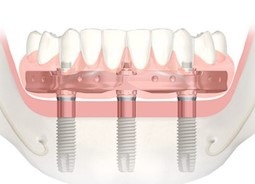
Trefoil® Hybrid Bridge (3 dental implants)
Fee: $$
Average Treatment time: 1-week
Benefits: Shortest treatment time and lowest cost for a non-removable replacement of bottom teeth. Maximum stability (not removable).
Drawbacks: Case selective – not every patient is a candidate for this treatment option. Hybrid bridge may be bulkier than conventional dental implant bridge.
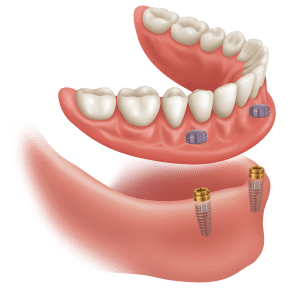
Denture snaps onto Locators® on Dental Implants (2-4 dental implants)
Fee: $ to $$
Average Treatment time: 4+ Months
Benefits: Low cost option to stabilize and secure dentures for improved comfort and function.
Drawbacks: Denture is not permanently attached, but rather removable. Movement of denture may be noticeable, and less secure than non-removable options. Retention inserts in denture need occasional replacement.
Images used with permission courtesy of Nobel Biocare and Zest Dental Solutions
Contact us to learn more about how our Dental Implants can help you live life more normally!

